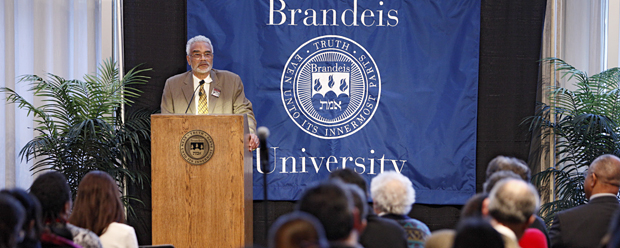Clayborne Carson: King was a prophet for all of humanity
Stanford scholar's Gittler Prize lecture challenges traditional thinking on MLK

Clayborne Carson
The foremost scholar of the life of Martin Luther King Jr. spent much of his career puzzling over the apparent conflict between the civil rights movement as a grassroots, bottom-up phenomenon and the top-down movement that it became.
“It has been the great task of my life to reconcile these opposing views,” Clayborne Carson, professor of history and director of Stanford University’s Martin Luther King, Jr., Research and Education Institute, said during a lecture in Rapaporte Treasure Hall.
Finally, Carson said, he came to the understanding that King was not a civil rights leader, but a prophet, and his vision was not for Montgomery, Alabama, or the United States, but for all humanity.
Carson was at Brandeis to accept the Joseph B. and Toby Gittler Prize, which he shared this year with Emory University Professor Emerita Frances Smith Foster, who delivered her prize lecture in November.
The $25,000 prize is a legacy of Joseph B. Gittler, a sociologist who taught at Cardozo Law School and numerous leading universities. The prize also honors Professor Gittler’s mother, Toby Gittler.
Carson said understanding King as a prophet rather than a civil rights leader is key to understanding many of his most famous speeches.
For example, the immortal “I Have a Dream” speech that King delivered during the March on Washington in August 1963 was expected to call on President John F. Kennedy and the Congress to pass the legislation that became the Civil Rights Act of 1964. Instead, King never mentioned the bill or the politicians and spoke extemporaneously of his vision for all humanity.
“He gives a speech about Thomas Jefferson, the Constitution, the Declaration of Independence and the Old Testament prophets, and then he talks about his dream,” Carson said. “He was talking to the architects of the Republic about American democracy, what does it mean?”
After winning the Nobel Prize in 1964, King began to talk in broader terms, Carson said, speaking out against poverty, disenfranchisement and war. “I came to focus more and more not on the ‘dream’ speech, but on what he said late in his life. Now I see him as someone who understood the ‘why’ of it all.
“As I have become older, King has become wiser,” Carson said. “He is a person who grows on you.”
In response to a question, Carson said King and Mahatma Gandhi cannot be understood without religion, and without understanding that, while religious, both men were uncomfortable, and probably heretics, in the context of their religions’ orthodoxies.
“Studying King sort of brought me back to my roots,” Carson said. “Here I am, in my 50s and 60s, reading the Old Testament prophets.
“Why are we here, what is our purpose, what are we trying to achieve with other people? Those kinds of questions can’t be answered by physics,” said Carson, who once aspired to be a nuclear physicist. But at the same time, “religion is not the answer, it is the search.”
Carson's extensive writings reflect not only his research about King but also his undergraduate civil rights and antiwar activism, which led him to appreciate the importance of grassroots political activity as well as visionary leadership in the African-American freedom struggle. His first book, “In Struggle: SNCC and the Black Awakening of the 1960s,” published in 1981, is the definitive history of the Student Nonviolent Coordinating Committee, the most dynamic and innovative civil rights organization.
He is author of “Malcolm X: The FBI File,” and co-author of “African American Lives: The Struggle for Freedom,” a comprehensive survey of African-American history.
In addition to the multi-volume series “The Papers of Martin Luther King, Jr.,” Carson's other works, based on those papers, include “The Autobiography of Martin Luther King, Jr.,” compiled from the King’s autobiographical writings, “A Knock at Midnight: Inspiration from the Great Sermons of Reverend Martin Luther King, Jr.,” and “A Call to Conscience: The Landmark Speeches of Dr. Martin Luther King, Jr.”
He also was a senior historical advisor for “Eyes on the Prize,” the 14-part, award-winning public television series on the civil rights movement, and collaborated with the Roma Design Group of San Francisco to create the winning proposal in an international competition to design the King National Memorial in Washington, D.C.
Carson said he will donate the Gittler prize money to the work of the King institute he heads at Stanford.
Categories: Humanities and Social Sciences





